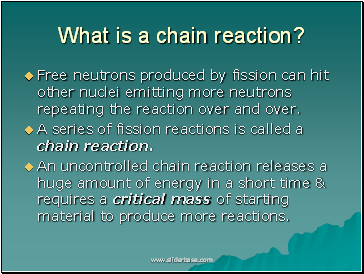Radioactivity and Nuclear ReactionsPage
9
9
1938- Otto Hahn & Fritz Strassmann split U-235 into smaller nuclei.
1939- Lise Meitner theorized that splitting occurs when the nucleus becomes so unstable that it splits.
The process of splitting a nucleus into smaller nuclei- nuclear fission
Slide 78
What nuclei can split during nuclear fission?
Only large nuclei like U or plutonium can split apart during nuclear fission.
Slide 79
What nuclei can split during nuclear fission?
U-236 is so unstable that it immediately splits into barium & krypton nuclei, several neutrons & a large amount of energy
Slide 80
How are mass & energy related?
Einstein proposed that mass & energy are related & can be changed from one to the other.
Slide 81
How are mass & energy related?
Einstein proposed that mass & energy are related & can be changed from one to the other.
His special theory of relativity says that energy in joules is equal to mass in kg multiplied by the speed of light squared.
Slide 82
How are mass & energy related?
Einstein proposed that mass & energy are related & can be changed from one to the other.
His special theory of relativity says that energy in joules is equal to mass in kg multiplied by the speed of light squared.
Energy (joules) = mass (kg) X speed of light (m/s)2 or E= mc2
Slide 83
What is a chain reaction?
Free neutrons produced by fission can hit other nuclei emitting more neutrons repeating the reaction over and over.
Slide 84
What is a chain reaction?
Free neutrons produced by fission can hit other nuclei emitting more neutrons repeating the reaction over and over.
A series of fission reactions is called a chain reaction.
Slide 85
What is a chain reaction?
Free neutrons produced by fission can hit other nuclei emitting more neutrons repeating the reaction over and over.
A series of fission reactions is called a chain reaction.
An uncontrolled chain reaction releases a huge amount of energy in a short time & requires a critical mass of starting material to produce more reactions.
Slide 86
Nuclear Fusion
Contents
- Radioactivity
- The Nucleus
- Is the nucleus the largest part of an atom?
- Modeling an Atom
- The Strong Force
- Radioactivity
- What are isotopes?
- What makes nuclei unstable?
- Nuclear Decay
- Nuclear Radiation
- Alpha Particles
- How can alpha particles harm you?
- What is transmutation
- Beta Particles
- Gamma Rays
- Radioactive Half-Life
- Half-Life
- Radioactive Dating
- Detecting Radioactivity
- Radiation Detectors
- What is a bubble chamber?
- Bubble Chamber
- Measuring Radiation
- Background Radiation
- Nuclear Reactions
- Nuclear Fission
- What is a chain reaction?
- Nuclear Fusion
- Fusion on the Sun
Last added presentations
- Madame Marie Curie
- Resource Acquisition and Transport in Vascular Plants
- Understanding Heat Transfer, Conduction, Convection and Radiation
- Radiation Safety and Operations
- Heat-Energy on the Move
- Sensory and Motor Mechanisms
- Waves & Sound









